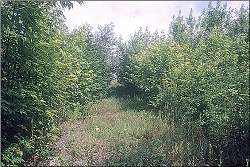Summary
Supporting growth of trees and other vegetation on restored landfill sites

Landfill sites represent a large land area of the UK, with great potential to support woody vegetation as part of sustainable reclamation. Forest Research investigated early and modern restoration practices to develop guidelines on the most suitable methods to support the growth of trees and other vegetation.
Status
This work began in 1998 and was completed in 2008
Findings and Recommendations
-
Tree survival rates: for most species, around 50-85 % of originally planted trees remain from early restoration work
- Exceptional survival: some species, including white poplar, whitebeam and ash, have survived exceptionally well considering the hostile landfill site conditions
- Growth: trees have grown steadily over 10 years, although growth rates differ between species and sites
- Limits: some of the tallest trees (exceeding 6 m in height) show slight signs of limitation to their growth
- Fastest growers: fastest growing species remain poplar, alder, cherry, whitebeam and ash
- Nutrients: all sites show signs of nitrogen deficiency, but few have low phosphorus or potassium
- Fertilisation: applications of nitrogen fertiliser may be required to achieve full canopy closure
- Soil cover: sustainable growth for trees over at least a decade require at least 1 m of soil cover; in droughty areas or in soils with low moisture-holding capacity, deeper soil cover is necessary
The research concluded that 1.5 m of soil or soil-forming material over a mineral cap will ensure that trees can be established on landfills without posing a significant threat to cap integrity for at least 16 years. It is still a little early to assess the full impact of tree rooting on cap integrity or the interaction between conditions within the landfill cap and tree rooting over the lifetime of a tree.
General Content
Publications
Foot, K. & Moffat, A. (2008). Woodland establishment on landfill sites, Ten Years of Research. Forest Research and Communities and Local Government
Woodland establishment on landfill sites: site monitoring (2000). Department for Communities and Local Government
Contact
Funding & Partners
- Department for Communities and Local Government (DCLG)
- Forestry Commission
